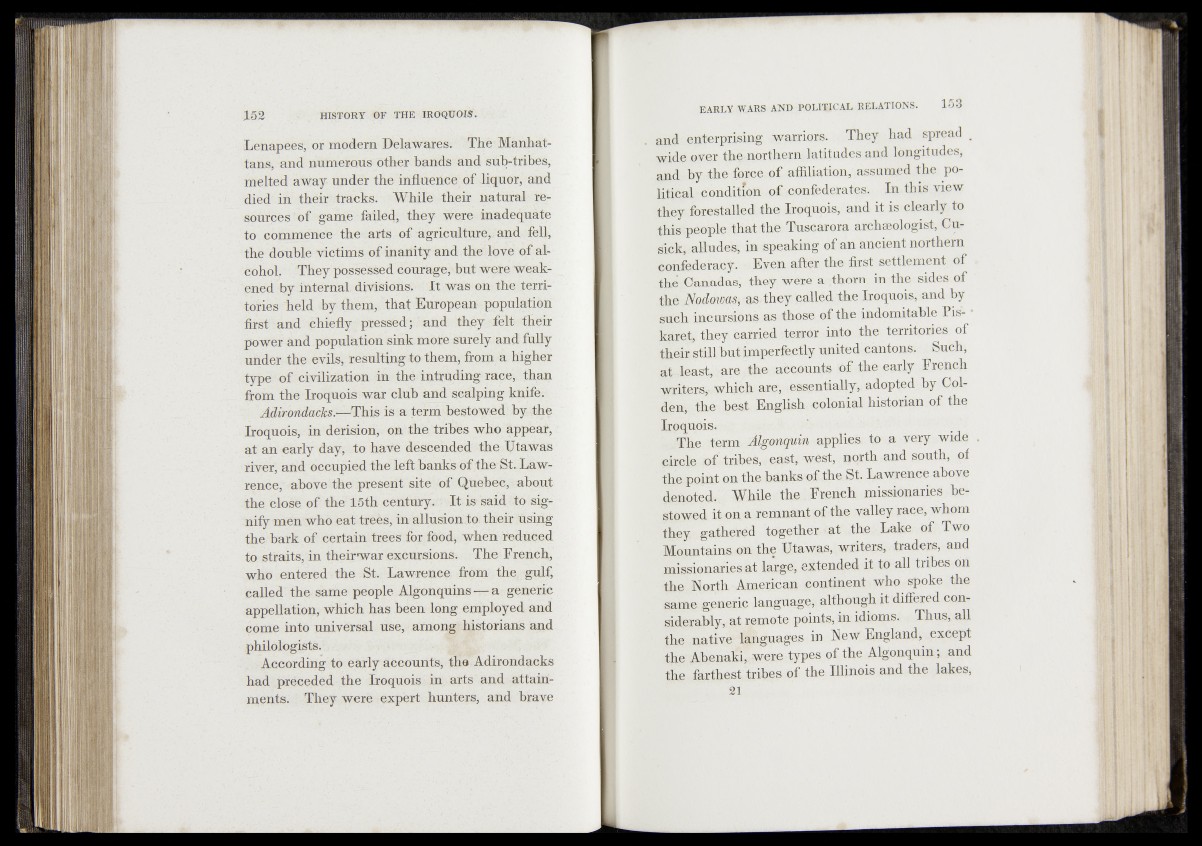
ÜÉgK p HISTORV/OF the ïr ö q ü o is . jjf
Lenapees, or modern Delawaresr- ^The'Manhattan^
'and numerous other hands and sub-trifes,
melted away under the influence; of liquor, and
died in tbeirtracks. While their natural resources
of game failed^ they were inadequate
to commence the arts of agriculture;, and fell,
the double wictims of inanity and the'love of alcohol.
They possessed courage, but were weak-
ened by intèfnal, divisions. It was on the territories
held by thèm, "that European population
first and chiefly_ pressed; * and they-felt* their
powernnd population sink more surely and fully
under the evils, resulting to them, from a higher
type of civilization in the intruding race, than
é&m the Iroquois war club and scalping knife.
Advrondacks.—This is a term bestowed by,the
Iroquois, in derision, on the tribes who appear,
at an early day, to have descended theriptawas
river, and occupied the left banks of the-St. Lawrence,’
above the present site of Quebec, - about
the close of ther 15th century; Ibis* said to signify
men who eat treès, in allusion fe their fising
the bark of certain trees for fobd, when deduced
to straits, in their war excursions. The; French,
who entered the St. Lawrence, from the^gulf,
Called'the same people Algonqums — a generic
appellation, which has been long employed and
come into universal use, among l^storians and
philologists.
According to early accounts, tLa Adirondacks
had preceded the Iroquois in arts and attainments.
They were expert hunters, and brave
and .enterprising warriors. ; They had spread .
wide over themorthern latitudes and longitudes,
aud by the force pf affiliation, assumed the political
- condition of confederates,. In this view
they forestalled the Iroquois, and it is ciearly to
this people that theyTuscarora archaeologist, Cu-
sickr alludes, m speaking of an ancient northern
confederacy. Even after the first settlement of <
the Canadas, they were a fifiorn in the sides of
the 'aS'they C.alled'the Iroquois, and by
such incursions -as these of the indomitable Pis- •
karefi they carried fierror-into the territories of
their still hut imperfectly united cantons. Such,
af-feast, ^are^tke .accounts of the early French
writers,-which are, -essentially, adopted by Col-
den, the-best English colonial historian of the
Irpquois. ibitrfcr
*.^The term 'Algonquin applies, to a very wide ,
circle .of tribes, edsfi west, north and south, of
the point on the, banks of the St. Lawrence ahoy#
denoted. While the, French missionaries bestowed
it on a remnant of the valley raee, whom
they gathered together mt the Lake of Two
Mountains on the Utawas, writers, traders, and
missionaries at large, extended it to all tribes on
the JNorth American continent who spoke the
same generic language, .although it differed considerably,
at remote points, in idioms. Thus, all
the native languages in Kew England, except
the Abenaki,,were types of the Algonquin; and
the farthest tribes of the Illinois and the lakes,
21